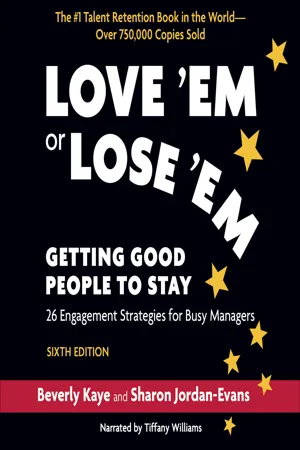
Love 'Em or Lose 'Em, Sixth Edition
Getting Good People to Stay: 26 Engagement Strategies for Busy Managers
- 336 pages
- English
- ePUB (mobile friendly)
- Available on iOS & Android
Love 'Em or Lose 'Em, Sixth Edition
Getting Good People to Stay: 26 Engagement Strategies for Busy Managers
About this book
The 6th edition of the #1 employee retention guide offers twenty-six simple strategies organized from A to Z and a new emphasis on diversity & inclusion.
"To be a great team, you need outstanding players. The authors show you how to engage your outstanding players and keep them on your team for a long time." —Mike Krzyzewski, Head Coach, Duke University Men's Basketball
Despite booms and busts, technology advances, talent wars, layoffs, and even a global pandemic, people want what they've always wanted. Employees want—and now expect—meaningful work, supportive bosses, regular recognition, and a chance to learn and grow. And managers want their amazing people to stay—for at least a little while longer. For two decades, this Wall Street Journal bestseller—over 800,zero sold—has offered twenty-six simple strategies, from A to Z, that managers can use to address their employees' real concerns and keep them engaged.
The authors have gone over every word of the previous edition, revising, updating, and streamlining. This edition includes a timely focus on diversity and inclusion in every chapter. For example, chapter six focuses on family. Different cultures view family responsibilities differently, so the authors address how to take that into consideration when a treasured employee asks for extended leave to care for a grandparent. And a new section called "Conversations That Count" offers discussion questions for sparking deeper conversation around the topics in the book.
This new edition will ensure that Love 'Em or Lose 'Em will continue to help managers all over the world create a supportive workplace culture so they can fight burnout and keep the people they can least afford to lose.
"The future of work actually has little to do with technology, AI, or algorithms. It's all about people, organizations, and how we manage people within those organizations. Bev and Sharon's book will guide and advise leaders at all levels in making the right people-focused decisions. Readers will find specific and practical ideas to help them be more inclusive and empathetic leaders." —Josh Bersin, global industry analyst
"The principles laid out in Love 'Em or Lose 'Em offer opportunity for people committed to advancing true equity and inclusion in their businesses." —Liji Thomas, Head of Diversity and Inclusion, Southern California Edison
Frequently asked questions
- Essential is ideal for learners and professionals who enjoy exploring a wide range of subjects. Access the Essential Library with 800,000+ trusted titles and best-sellers across business, personal growth, and the humanities. Includes unlimited reading time and Standard Read Aloud voice.
- Complete: Perfect for advanced learners and researchers needing full, unrestricted access. Unlock 1.4M+ books across hundreds of subjects, including academic and specialized titles. The Complete Plan also includes advanced features like Premium Read Aloud and Research Assistant.
Please note we cannot support devices running on iOS 13 and Android 7 or earlier. Learn more about using the app
Information
CHAPTER ONE
Ask
WHY DO YOU STAY?
Conduct Stay Interviews



Guessing Is Risky
How and When to Ask
He Dared to Ask
What If—
What If You Can’t Give What They Want?
Table of contents
- Cover
- Title Page
- Copyright Page
- Dedication
- Contents
- Introduction: A Proven Approach to Managing and Leading
- Get What You Need from This Book
- 1. Ask * Why Do You Stay
- 2. Buck * It Stops Here
- 3. Careers * Support Growth
- 4. Dignity * Show Respect
- 5. Enrich * Energize the Job
- 6. Family * Get Friendly
- 7. Goals * Expand Options
- 8. Hire * Fit Is It
- 9. Information * Share It
- 10. Jerk * Don’t Be One
- 11. Kicks * Get Some
- 12. Link * Create Connections
- 13. Mentor * Be One
- 14. Numbers * Run Them
- 15. Opportunities * Mine Them
- 16. Passion * Encourage It
- 17. Question * Reconsider The Rules
- 18. Reward * Provide Recognition
- 19. Space * Give It
- 20. Truth * Tell It
- 21. Understand * Listen Deeper
- 22. Values * Define and Mine
- 23. Wellness * Sustain It
- 24. X-plore Generations * Beware and Be Aware
- 25. Yield * Power Down
- 26. Zenith * Go For It
- Conversations That Count
- Notes
- Acknowledgments
- Index
- About the Authors
- Beyond the Book